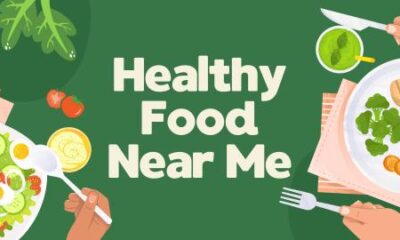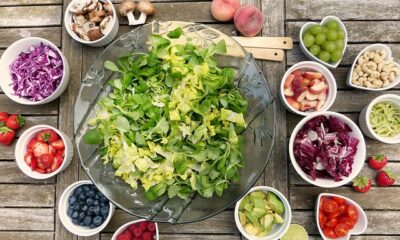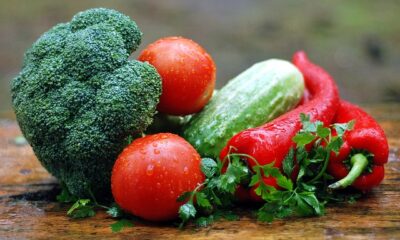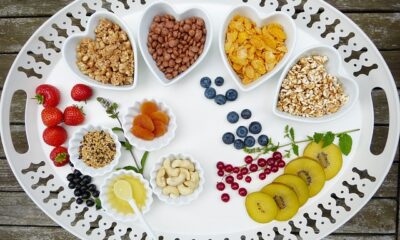Uncategorized
Feel Alive Again: Transform Your Well-Being with These 15 Wholesome Foods

Introduction
Eating healthy isn’t just about counting calories or following the latest diet trend. It’s about nourishing your body with the nutrients it needs to thrive and feel your best. Incorporating a variety of nutrient-dense foods into your diet is key to promoting overall health and well-being.
Leafy Greens
Leafy greens like spinach, kale, and Swiss chard are nutritional powerhouses packed with vitamins, minerals, and antioxidants. They’re low in calories but high in fiber, which helps keep you feeling full and satisfied. Adding leafy greens to your meals can help support healthy digestion, promote heart health, and even reduce the risk of chronic diseases like diabetes and cancer.
Berries
Berries are not only delicious but also incredibly nutritious. They’re loaded with antioxidants, which help protect your cells from damage caused by free radicals. Blueberries, strawberries, raspberries, and blackberries are all excellent choices for boosting your intake of vitamins, minerals, and fiber. Incorporating berries into your diet can support brain health, improve heart health, and even help manage blood sugar levels.
Nuts and Seeds
Nuts and seeds are rich in healthy fats, protein, and fiber, making them a satisfying and nutritious snack option. Almonds, walnuts, chia seeds, and flaxseeds are just a few examples of nutrient-dense nuts and seeds that can help support overall health. They’re also packed with antioxidants and other beneficial plant compounds that can reduce inflammation and lower the risk of chronic diseases like heart disease and diabetes.
Whole Grains
Whole grains like quinoa, brown rice, and oats are excellent sources of fiber, vitamins, and minerals. Unlike refined grains, which have been stripped of their nutrient-rich outer layer, whole grains retain all of their natural goodness. Incorporating whole grains into your diet can help regulate blood sugar levels, promote digestive health, and reduce the risk of heart disease and stroke.
Lean Proteins
Protein is an essential nutrient that plays a key role in building and repairing tissues, supporting immune function, and regulating hormones. Lean protein sources like chicken, turkey, tofu, and tempeh are low in saturated fat and cholesterol, making them heart-healthy choices. Including lean proteins in your meals can help keep you feeling full and satisfied while supporting muscle growth and recovery.
Fatty Fish
Fatty fish like salmon, mackerel, and sardines are rich in omega-3 fatty acids, which are essential for heart health and brain function. These healthy fats have been shown to reduce inflammation, lower blood pressure, and improve cholesterol levels. Eating fatty fish regularly can also lower the risk of age-related cognitive decline and improve mood and mental well-being.
Yogurt
Yogurt is a probiotic-rich food that’s packed with beneficial bacteria that support gut health. Opt for plain, unsweetened yogurt to avoid added sugars and artificial flavors. Greek yogurt, in particular, is higher in protein and lower in sugar than regular yogurt, making it an excellent choice for supporting digestive health and boosting immunity.
Beans and Legumes
Beans and legumes like black beans, chickpeas, and lentils are excellent sources of plant-based protein, fiber, vitamins, and minerals. They’re also low in fat and cholesterol, making them heart-healthy choices. Adding beans and legumes to your meals can help improve blood sugar control, promote satiety, and reduce the risk of chronic diseases like diabetes and obesity.
Avocado
Avocado is a unique fruit that’s loaded with healthy fats, fiber, vitamins, and minerals. It’s rich in monounsaturated fats, which have been shown to reduce inflammation and lower the risk of heart disease. Avocado also contains potassium, which helps regulate blood pressure, and folate, which is essential for fetal development during pregnancy. Enjoy avocado sliced on toast, blended into smoothies, or mashed into guacamole for a delicious and nutritious addition to your diet.
Olive Oil
Olive oil is a staple of the Mediterranean diet and is prized for its heart-healthy benefits. It’s rich in monounsaturated fats and antioxidants, which help reduce inflammation and protect against oxidative stress. Incorporating olive oil into your cooking and salad dressings can help lower cholesterol levels, improve blood sugar control, and reduce the risk of heart disease and stroke.
Sweet Potatoes
Sweet potatoes are a nutritious and delicious alternative to regular potatoes. They’re packed with vitamins, minerals, and fiber, making them a filling and satisfying addition to any meal. Sweet potatoes are rich in beta-carotene, which is converted into vitamin A in the body and is essential for vision, immune function, and skin health. Enjoy sweet potatoes roasted, mashed, or baked for a nutritious side dish or snack.
Eggs
Eggs are a versatile and nutrient-rich food that’s perfect for any meal of the day. They’re a complete source of protein, meaning they contain all nine essential amino acids that the body needs to function properly. Eggs are also rich in vitamins and minerals like vitamin D, vitamin B12, and selenium. Incorporating eggs into your diet can help support muscle growth, promote satiety, and improve overall health.
Tomatoes
Tomatoes are not only delicious but also incredibly nutritious. They’re packed with vitamins, minerals, and antioxidants, including lycopene, which gives them their vibrant red color. Lycopene has been linked to a reduced risk of heart disease, prostate cancer, and other chronic diseases. Enjoy tomatoes raw in salads, cooked in sauces, or roasted with herbs for a tasty and nutritious addition to your meals.
Garlic
Garlic is a flavorful herb that’s been used for centuries for both culinary and medicinal purposes. It’s packed with vitamins, minerals, and antioxidants that have powerful health benefits. Garlic has been shown to reduce inflammation, lower cholesterol levels, and boost immune function. Adding garlic to your dishes can enhance flavor while promoting overall health and well-being.
Conclusion
Incorporating these top 15 healthy foods into your diet can help support overall health and well-being. From leafy greens and berries to nuts and seeds, there are plenty of delicious and nutritious options to choose from. By making small changes to your diet and focusing on nutrient-dense whole foods, you can feel confident that you’re nourishing your body and fueling it for optimal health.
FAQs
- Can I still enjoy treats while eating healthy?
- Absolutely! Eating healthy doesn’t mean you have to give up your favorite treats altogether. It’s all about balance and moderation.
- How can I make sure I’m getting enough variety in my diet?
- Try to incorporate a diverse range of foods from all food groups into your meals and snacks. Experiment with different flavors, textures, and cuisines to keep things interesting.
- Are frozen fruits and vegetables as nutritious as fresh ones?
- Yes, frozen fruits and vegetables are often just as nutritious as fresh ones, if not more so. They’re picked at peak ripeness and flash-frozen to lock in nutrients.
- Can I lose weight by just eating these healthy foods?
- While incorporating these healthy foods into your diet can support weight loss, it’s important to also pay attention to portion sizes, overall calorie intake, and physical activity levels.
- How quickly will I notice a difference in my health after changing my diet?
- Everyone’s body is different, so the timeline for noticing changes in health can vary. However, many people report feeling more energetic, sleeping better, and experiencing improved digestion shortly after making dietary changes.
-

 Uncategorized2 months ago
Uncategorized2 months ago15 Deceptive Myths About Nutritious Eating We’ve Embraced for Generations
-

 Uncategorized1 month ago
Uncategorized1 month agoNavigating the Pursuit of Wellness: Unveiling the Domain of Healthy Food Near Me
-

 Snacks and Appetizers6 months ago
Snacks and Appetizers6 months agoCrunchy crisps from the oven: the perfect snack without the shame
-

 Lunch and Dinner Recipes6 months ago
Lunch and Dinner Recipes6 months agoSeafood sensation: delicious and nutritious fish recipes for a healthy dinner
-

 Breakfast Recipes6 months ago
Breakfast Recipes6 months agoHomemade power bar: the excellent grab-and-go breakfast option for an active early morning
-

 Lunch and Dinner Recipes6 months ago
Lunch and Dinner Recipes6 months agoVegetarian Stir-Fry: A Burst Of Health And Flavor In Every Bite
-

 Snacks and Appetizers6 months ago
Snacks and Appetizers6 months agoDeliciously hot Guacamole and salsa recipes to enhance the great experience
-

 Breakfast Recipes6 months ago
Breakfast Recipes6 months agoProtein-Packed Pancakes: A Delicious Method To Start Your Day














